Precision CNC Thread Rolling Machine | Automated Threading Solutions
Introduction to CNC Thread Rolling Machines and Industry Trends
The demand for high-precision, high-strength threaded components across various industries has driven significant advancements in manufacturing technology. Central to this evolution is the cnc thread rolling machine, a sophisticated piece of equipment that cold-forms threads onto cylindrical workpieces. This process offers superior metallurgical properties compared to traditional cutting or grinding methods, including increased fatigue strength, improved surface finish, and enhanced resistance to wear and tear.
Current industry trends highlight a shift towards greater automation, digitalization, and integration within manufacturing ecosystems. Manufacturers are increasingly seeking machines that offer not only precision and speed but also intelligent control, real-time monitoring, and seamless connectivity for Industry 4.0 applications. The advent of advanced materials, coupled with ever-tightening tolerance requirements, further underscores the necessity for machines capable of consistent, repeatable performance. The market for thread rolling technology is expanding, driven by growth in automotive, aerospace, construction, and heavy machinery sectors, all of which rely heavily on robust, reliable fasteners and threaded components. Specific demand is rising for technologies that support efficient production of specialized threads, such as those found in anchor bolts and stainless rods, necessitating versatile and robust machinery.
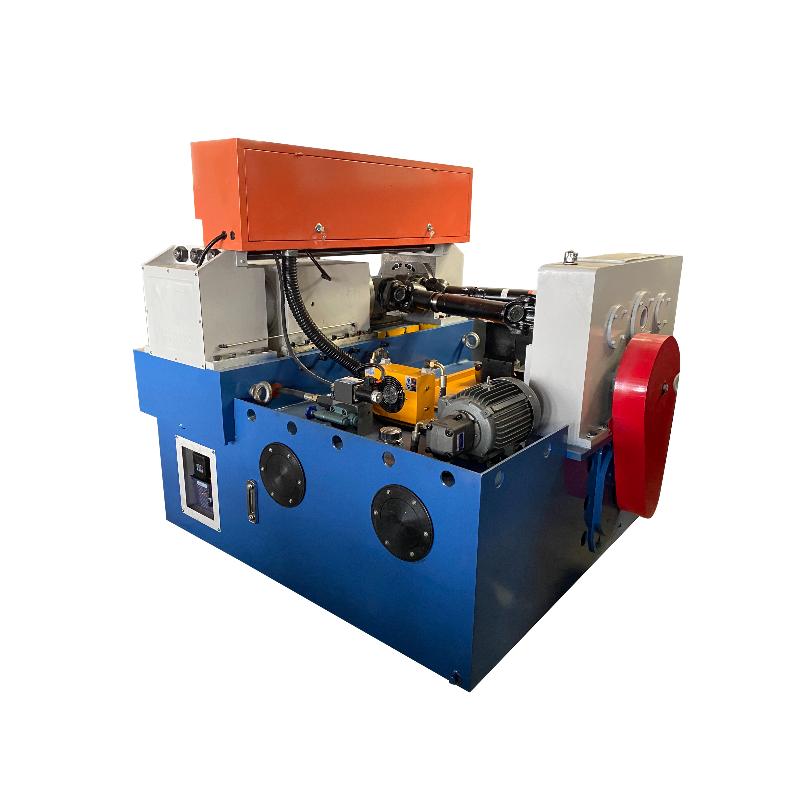
Detailed Process Flow of CNC Thread Rolling
The manufacturing process utilizing a cnc thread rolling machine is a highly controlled and precise cold-forming operation. Unlike material removal processes, thread rolling reshapes the material, densifying the grain structure and improving mechanical properties.
Materials and Preparation:
Workpieces are typically cylindrical blanks, often manufactured from materials such as alloy steels (e.g., 4140, 4340), stainless steels (e.g., 304, 316), and various non-ferrous metals. The material must possess sufficient ductility and yield strength for cold forming. Pre-treatment might include annealing to optimize ductility or specific surface finishes. Blank diameter is crucial, as it dictates the final major diameter of the thread after rolling, typically being slightly less than the pitch diameter of the finished thread.
Manufacturing Process Steps:
Process Schematic:
- Blank Feeding: Raw cylindrical blanks are automatically fed into the machine via a vibratory bowl feeder or magazine loader, ensuring consistent presentation to the rolling dies. (Automation & Material Handling)
- ↓
- Workpiece Clamping: The blank is precisely positioned and securely clamped between the thread rolling dies. This step is critical for maintaining concentricity and preventing slippage during the rolling process. (Precision Fixturing)
- ↓
- Die Engagement & Cold Forming: Two or three thread rolling dies (flat or cylindrical) engage the rotating workpiece. As the dies press into the blank, their profiles progressively cold-form the material into the desired thread shape. The CNC system precisely controls pressure, rotation speed, and feed rate. (CNC Machining, Cold Forging)
- ↓
- Thread Completion & Release: Once the thread profile is fully formed to specification, the dies retract, and the finished threaded component is released. The process is continuous for high-volume production. (Automated Ejection)
- ↓
- Post-Process Handling: Finished parts may undergo deburring, cleaning, and quality inspection. For specific applications, heat treatment or surface coatings might be applied post-rolling. (Quality Control & Finishing)
Testing Standards and Service Life:
Finished threaded components are subjected to rigorous testing to ensure compliance with international standards such as ISO (International Organization for Standardization), ANSI (American National Standards Institute), and DIN (Deutsches Institut für Normung). Key parameters tested include pitch diameter, major diameter, minor diameter, lead accuracy, thread form, and surface finish. Mechanical properties like tensile strength, yield strength, and fatigue life are also verified through destructive and non-destructive testing. A properly manufactured thread rolling machine, with regular maintenance and quality tooling, can provide an extensive service life, often exceeding 10-15 years in continuous industrial operation, delivering consistent output and minimal downtime.
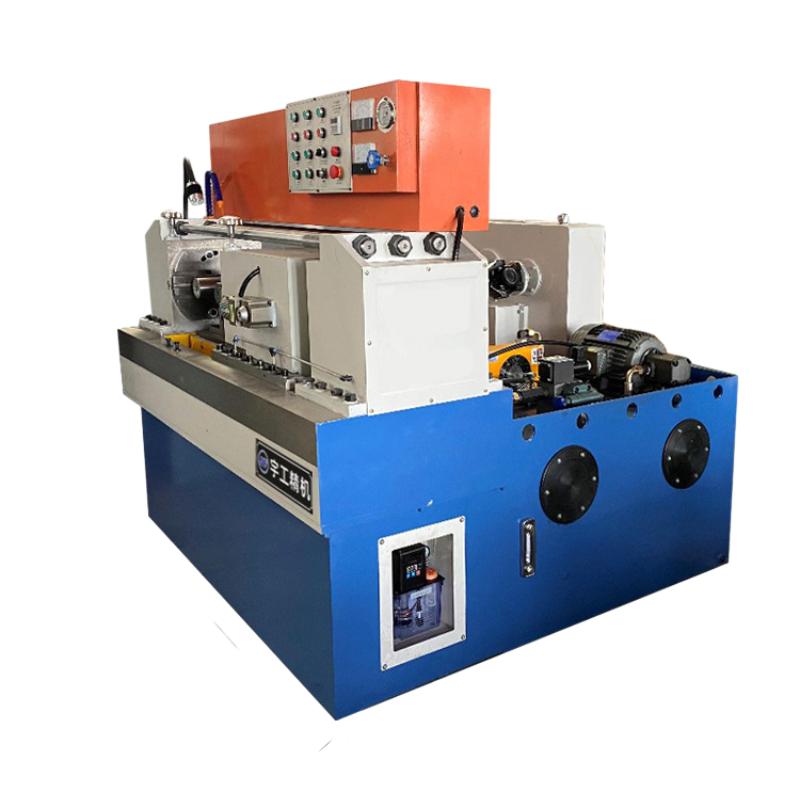
Technical Specifications and Parameters
Modern cnc thread rolling machine models are characterized by a range of technical specifications that define their capabilities and performance. These parameters are crucial for engineers and procurement specialists to select the right machine for their specific production needs.
Key Product Specifications:
| Parameter | Specification Range | Typical Value (Anchor Bolt Machine) |
|---|---|---|
| Thread Diameter Range | Ø3 mm - Ø100 mm | Ø10 mm - Ø50 mm |
| Thread Pitch Range | 0.5 mm - 10 mm | 1.5 mm - 5 mm |
| Max Thread Length | 20 mm - 6000 mm (thru-feed) | Up to 300 mm (in-feed), 3000 mm (thru-feed) |
| Rolling Force | 5 Tons - 100 Tons | 30 - 60 Tons |
| Spindle Speed | 50 rpm - 2000 rpm | 100 - 500 rpm |
| Motor Power | 5.5 kW - 75 kW | 15 kW - 30 kW |
| Control System | Siemens, Fanuc, Mitsubishi CNC | Siemens SINUMERIK 828D |
| Machine Weight | 2,000 kg - 25,000 kg | 8,000 kg - 15,000 kg |
The performance of a cnc thread rolling machine is heavily influenced by its rigidity, the precision of its lead screws and guideways, and the sophistication of its CNC control system. Advanced machines often feature hydrostatic bearings for enhanced precision and longevity, ensuring minimal vibration and thermal stability during high-volume production.
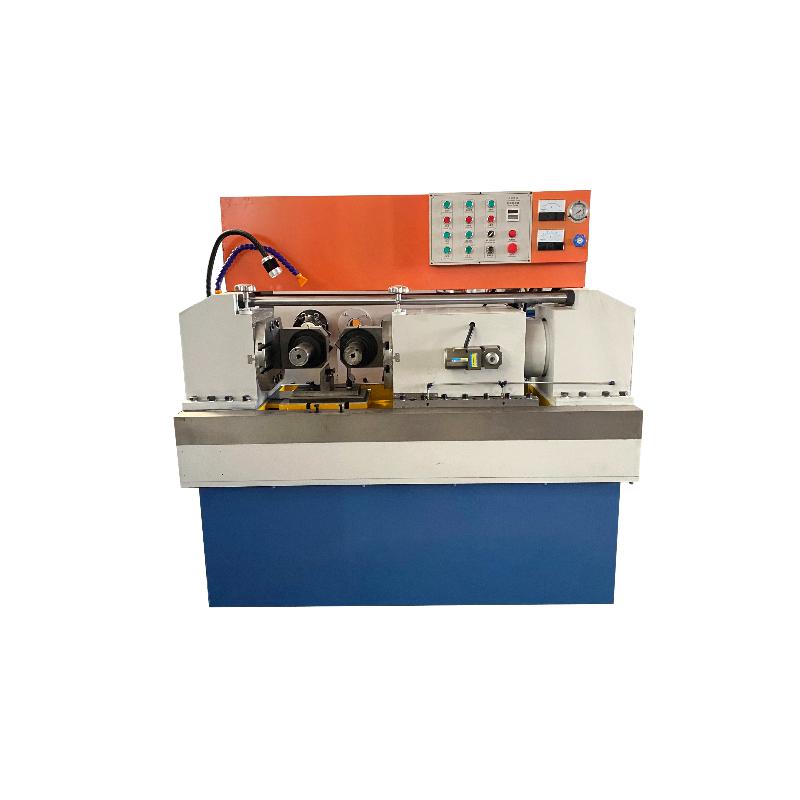
Technical Advantages and Application Scenarios
Advantages of CNC Thread Rolling:
- Superior Material Strength: Cold forming compacts the material's grain structure, increasing tensile, shear, and fatigue strength by up to 30% compared to cut threads. This is particularly vital for applications requiring high load-bearing capacity.
- Excellent Surface Finish: The rolling process produces a smooth, burnished surface finish, free from micro-cracks and tears inherent in cutting processes, which enhances corrosion resistance and reduces stress concentration.
- Enhanced Corrosion Resistance: The densified surface and improved finish contribute to better resistance against environmental corrosion, critical for components in petrochemical and water supply & drainage industries.
- Material Savings and Energy Efficiency: Thread rolling is a chipless process, meaning no material is wasted as chips, leading to significant material savings. Modern CNC machines are also designed for energy saving through optimized motor control and hydraulic systems.
- High Production Rates: With automated feeding and rapid forming cycles, CNC thread rolling machines offer high output volumes, reducing per-unit cost.
- Consistent Quality and Repeatability: The precision of CNC control ensures consistent thread geometry and quality across large production batches, minimizing deviations.
Target Industries and Typical Applications:
The versatility and robust output of cnc thread rolling machine technology make it indispensable across a multitude of heavy industries.
- Petrochemical Industry: Production of high-strength fasteners and studs for pipelines, pressure vessels, and structural components that operate under extreme pressures and corrosive environments. The enhanced corrosion resistance and strength are paramount here.
- Metallurgy & Mining: Manufacturing of heavy-duty anchor bolts, rock bolts, and tie rods used in structural foundations, tunnel supports, and mining equipment, where durability and fatigue life are critical.
- Water Supply & Drainage: Creation of robust bolts and threaded rods for municipal infrastructure, water treatment plants, and large-diameter pipe connections, where long-term integrity against environmental factors is essential.
- Automotive & Aerospace: Production of critical fasteners for engines, chassis, and airframes, requiring tight tolerances, high fatigue strength, and reliability under dynamic loads.
- Construction & Infrastructure: Manufacturing of rebar couplers, foundation bolts, and general construction fasteners. Machines designed for long rods, such as a flat thread rolling machine or a specialized anchor bolt machine, are frequently used here.
- Agricultural Machinery: Durable bolts and threaded components for tractors, implements, and heavy farm equipment, which operate in harsh outdoor conditions.
For example, in energy infrastructure, the integrity of a turbine's anchor bolts directly impacts safety and operational efficiency. A hydraulic threading machine, with its precisely controlled rolling force, ensures that these critical fasteners meet stringent specifications for both strength and dimensional accuracy, reducing the risk of failure due to material fatigue or environmental degradation.
Vendor Comparison and Customized Solutions
Selecting the right cnc thread rolling machine involves a thorough evaluation of various vendors and their offerings. Key differentiators often include machine robustness, control system sophistication, post-sales support, and the ability to provide customized solutions.
Vendor Comparison Matrix:
| Feature/Vendor | Vendor A (e.g., European Specialist) | Vendor B (e.g., Asian Innovator - Motetools) | Vendor C (e.g., North American Provider) |
|---|---|---|---|
| Machine Rigidity / Build Quality | Excellent (Cast Iron Frame, Heavy Duty) | High (Optimized Steel Welded Frame) | Very Good (Modular Construction) |
| Control System & Automation | Advanced Siemens/Fanuc, Full Automation | Modern Siemens/Mitsubishi, Smart Diagnostics | Allen-Bradley, Robotic Integration Options |
| Precision & Repeatability | ±0.005 mm | ±0.008 mm | ±0.007 mm |
| Versatility (Thread Types/Materials) | High (Metric, Imperial, ACME, Stainless, Alloy) | Very High (Specialized Profiles, Diverse Materials) | High (Focus on Standard Fasteners) |
| Energy Efficiency | Excellent (Servo-Hydraulic Systems) | Very Good (Optimized Motor & Pump) | Good (Standard Hydraulic Systems) |
| Price Point | Premium | Competitive | Mid-to-High |
| After-Sales Support & Spares | Global Network, High Cost | Responsive, Accessible Globally, Moderate Cost | Regional Strong, Varies by Dealer |
Customized Solutions:
For specialized applications, standard off-the-shelf machines may not suffice. Leading manufacturers like Motetools offer extensive customization capabilities for their thread rolling equipment. This can include:
- Extended Thread Length Capacity: Tailoring machines for exceptionally long rods, such as those required for specific construction or anchor bolt applications.
- Specialized Die Designs: Development of unique rolling dies for non-standard thread profiles, custom pitches, or challenging materials.
- Integrated Automation: Custom loading/unloading systems, robotic cell integration, and in-line inspection systems to fit specific production lines. This could range from a simple magazine feeder for a mini thread rolling machine to a fully automated gantry system for heavy-duty applications.
- Material Handling Solutions: Custom solutions for feeding and discharging fragile, pre-processed, or uniquely shaped blanks.
- Advanced Control Features: Implementation of specific software functionalities for complex threading cycles, data logging, or integration with factory MES (Manufacturing Execution System).
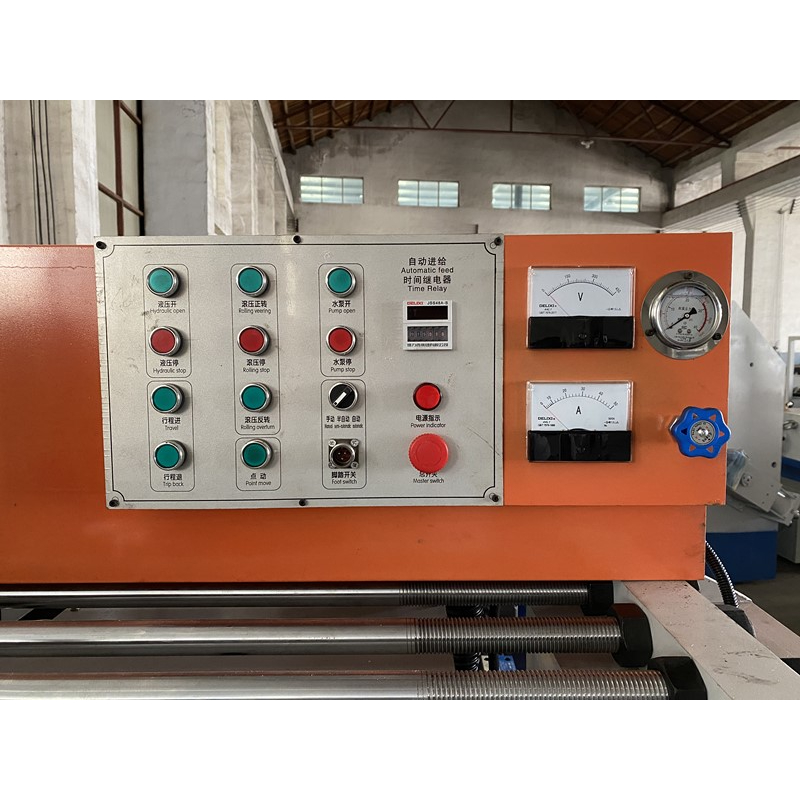
Application Case Studies and Customer Experience
Real-world applications demonstrate the tangible benefits of investing in a high-quality cnc thread rolling machine. These case studies highlight improved efficiency, product quality, and cost savings.
Case Study 1: High-Volume Fastener Production for Automotive Tier 1 Supplier
A leading automotive Tier 1 supplier needed to increase production of high-strength connecting rod bolts and studs while maintaining strict ISO/TS 16949 quality standards. They previously relied on cut threading, which resulted in significant material waste and lower fatigue life. Implementing a Motetools CNC thread rolling machine, specifically designed for high-speed operation and precision, allowed them to:
- Reduce material waste by 15% due to the chipless rolling process.
- Increase fatigue strength of the bolts by 25%, crucial for engine safety.
- Achieve a 40% increase in production output, meeting demanding OEM schedules.
- Maintain thread pitch diameter tolerance within ±0.008 mm consistently across millions of parts.
Customer Feedback: "The Motetools machine significantly enhanced our bolt manufacturing. The consistent quality and reduced cycle times directly contributed to our overall operational efficiency and product reliability."
Case Study 2: Large Diameter Threaded Rods for Bridge Construction
A civil engineering firm required durable, corrosion-resistant threaded rods (up to Ø60 mm, several meters long) for a major bridge construction project in a coastal region. The requirements included high tensile strength and superior resistance to saltwater corrosion. A specialized Motetools hydraulic threading machine with extended thru-feed capability was installed.
- Successfully produced threads on high-grade stainless steel rods up to 4 meters in length.
- Achieved a burnished thread surface, significantly improving resistance to crevice corrosion compared to machined threads.
- Ensured uniform thread profiles, crucial for secure coupling and load distribution in the bridge structure.
- Reduced total manufacturing time for these specialized components by 30%.
Customer Feedback: "The reliability of the threaded rods produced by our new Motetools machine gave us immense confidence in the structural integrity of the bridge. The technical support during setup was exceptional."
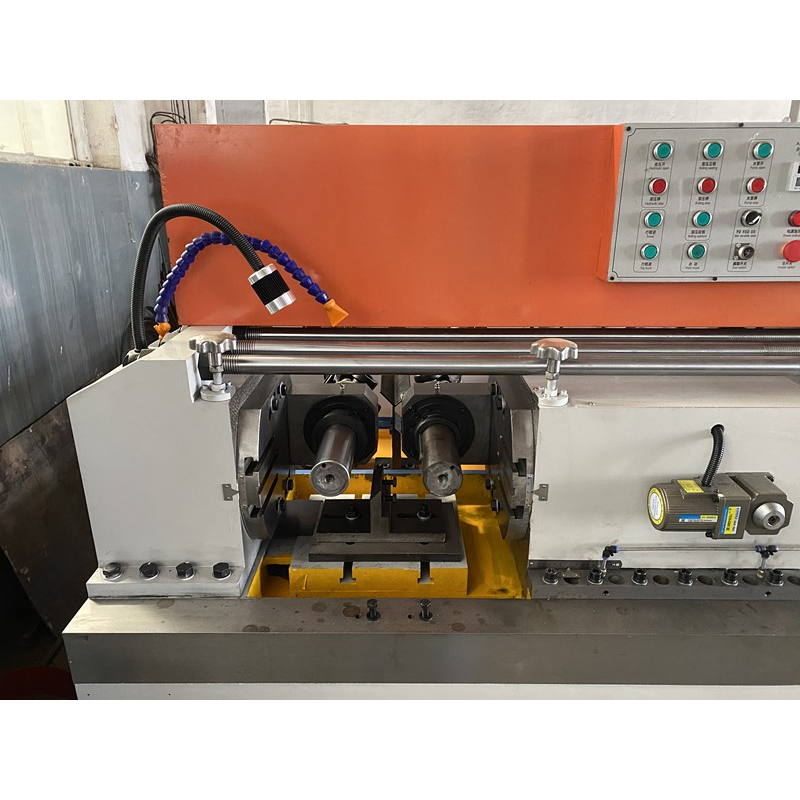
Trustworthiness: FAQ, Lead Time, Warranty, and Support
At Motetools, we understand that investment in industrial machinery is a strategic decision. We are committed to fostering trust through transparency, reliable support, and clear commitments. Our products, like the anchor bolt stainless rod thread making machine, adhere to stringent quality control procedures, including ISO 9001:2015 certified manufacturing processes.
Frequently Asked Questions (FAQ):
Q: What is the primary difference between thread rolling and thread cutting?
A: Thread rolling is a cold-forming process that reshapes material, increasing its strength and producing a superior surface finish without material waste. Thread cutting removes material, creating chips, and can leave micro-tears that reduce fatigue strength.
Q: Can your CNC thread rolling machines process high-strength alloys?
A: Yes, our machines are designed with high rigidity and powerful hydraulic systems to process a wide range of materials, including high-strength alloy steels, stainless steels, and exotic alloys, provided the material has sufficient ductility for cold forming.
Q: What kind of threads can your machines produce?
A: Our machines can produce various thread forms, including Metric, UNC, UNF, ACME, Trapezoidal, and special custom profiles. The specific thread type depends on the rolling dies used.
Q: What are the typical energy consumption levels?
A: Our latest generation CNC thread rolling machines feature energy-efficient servo-hydraulic systems and optimized motor control, significantly reducing power consumption compared to older models. Specific consumption varies by machine size and workload, but we prioritize energy saving designs.
Lead Time and Fulfillment:
Standard machine models typically have a lead time of 8-12 weeks from order confirmation. For highly customized solutions or complex integrations, lead times may extend to 16-24 weeks. We work closely with clients to provide accurate timelines and regular updates throughout the manufacturing and delivery process. Our logistics team ensures secure and efficient global shipping.
Warranty Commitments:
All Motetools CNC thread rolling machines come with a standard 12-month warranty on mechanical and electrical components, effective from the date of installation or 18 months from shipment, whichever comes first. Extended warranty options are available upon request. Our warranty covers manufacturing defects and ensures free repair or replacement of faulty parts. Wear and tear parts are excluded.
Customer Support and After-Sales Service:
Our commitment extends far beyond the sale. Motetools provides comprehensive after-sales support globally, including:
- Technical Hotlines: 24/7 technical assistance for troubleshooting.
- On-Site Installation & Training: Expert engineers for machine setup, commissioning, and operator training to ensure optimal performance.
- Spare Parts Availability: A readily available stock of genuine spare parts to minimize downtime.
- Preventative Maintenance Programs: Tailored service contracts to ensure longevity and peak operational efficiency.
- Remote Diagnostics: Capabilities for remote access and diagnostics for quicker issue resolution.
Our dedication to customer satisfaction and operational excellence has earned us long-standing partnerships with industry leaders across various sectors.
Conclusion
The cnc thread rolling machine stands as a cornerstone technology for modern manufacturing, delivering unparalleled precision, strength, and efficiency in the production of threaded components. Its ability to cold-form threads offers distinct advantages in material integrity and fatigue resistance, making it the preferred method for critical applications across petrochemical, metallurgy, automotive, and construction industries. With continuous advancements in CNC technology, automation, and material science, thread rolling machines are set to play an even more crucial role in meeting the evolving demands for robust and reliable fasteners. Partnering with a reputable vendor offering comprehensive technical support, customization options, and strong warranty commitments is paramount to maximizing the return on investment in this essential manufacturing asset.
References:
- ASM International. (2005). ASM Handbook, Volume 14B: Metalworking Processes. ASM International.
- Klement, U. (2018). Fatigue of Engineering Materials: From Theory to Practice. Elsevier.
- Groover, M. P. (2010). Fundamentals of Modern Manufacturing: Materials, Processes, and Systems. John Wiley & Sons.
- ISO 965-1:2013, ISO general purpose metric screw threads — Tolerances — Part 1: Principles and basic data. International Organization for Standardization.


